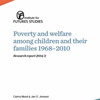whose
For Whose Benefit? The Biological and Cultural Evolution of Human Cooperation
Springer, New York. DOI: 10.1007/978-3-319-50874-0 This book takes the reader on a journey, navigating the enigmatic aspects of cooperation; a journey that starts inside the body and continues via our
A negative attitude toward immigration, the parliament and societal change, unite those who vore for the Sweden Democrats
During the last couple of decades, Europe has experienced significant political change as a result of new political parties that have emerged in many countries. We can see this development also in Swe
David Ellerman: Reframing the Labor Question
On Marginal Productivity Theory and the Labor Theory of Property. David Ellerman, Visiting scholar at the University of California in Riverside ABSTRACT Neoclassical economics uses the perfectly competit

Poverty and welfare among children and their families 1968–2010
Research report 2014/2, 78 p. This report studies child poverty, and changes in such poverty both by analyzing the family economy, and directly by using surveys with children themselves. It also compar
Regulating high-reach AI: On transparency directions in the Digital Services Act
Internet policy review, vol. 13:1 Abstract By introducing the concept of high-reach AI, this paper focuses on AI systems whose widespread use may generate significant risks for both individuals and soci
Bentham's Mugging
Utilitas, 2022, 1–6 Abstract A dialogue, in three parts, on utilitarian vulnerability to exploitation. Read the whole article
Access to occupational networks and ethnic variation of depressive symptoms in young adults in Sweden
Social Science & Medicine, Volume 190, pp. 207-216. doi.org/10.1016/j.socscimed.2017.08.022 Abstract Social capital research has recognized the relevance of occupational network contacts for individ
Should Extinction Be Forever?
Should Extinction Be Forever?, Philosophy and Technology, First online: 17 october 2015 This article will explore a problem which is related to our moral obligations towards species. Although the re-cr, (6128), 32–33, ). This article will provide an argument in favour of re-creation based on normative considerations. The environmentalist community generally accepts that it is wrong to exterminate species, for reasons beyond any instrumental value these species may have. It is often also claimed that humanity has a collective responsibility to either preserve or at least to not exterminate species. These two beliefs are here assumed to be correct. The argument presented here departs from and places these two ideas in a deontological framework, from which it is argued that when humanity causes the extinction of a species, this is a moral transgression, entailing a residual obligation. Such an obligation implies a positive duty to mitigate any harm caused by our moral failure. In light of recent scientific progress in the field of genetic engineering, it will be argued that humanity has a prima facie obligation to re-create species whose extinction mankind may have caused, also known as de-extinction.
Extended Preferences and Interpersonal Comparisons of Well‐being
Philosophy and Phenomenological Research. Published online 7 November 2016. doi.org/10.1111/phpr.12334 Abstract An important objection to preference‐satisfaction theories of well‐being is that these the
Towards a Theory of Pure Procedural Climate Justice
Journal of Applied Philosophy, published online first, doi.org/10.1111/japp.12357 Abstract A challenge for the theorising of climate justice is that even when the agents whose actions are supposed to be r








